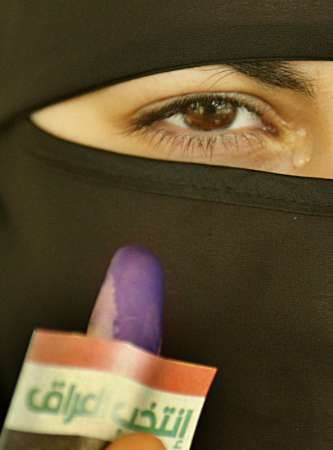Did I miss something, or is Bush now making deals with terrorists?
From the Washington Times:
By Paul Martin
December 21, 2005 BAGHDAD
American diplomats called it “mission impossible” — to bend the rules on contact with powerful anti-American Sunni forces in Iraq and negotiate a cease-fire — all before last week’s elections.
Their orders came from U.S. Ambassador Zalmay Khalilzad. The effort took months and culminated in a day of voting in which Sunni Arabs came out in droves after having boycotted the first parliamentary election a year ago.
The cease-fire period started Dec. 13 and ended Sunday, spanning Thursday’s elections. The period passed with no major attacks on Iraqi civilians.
The effort by U.S. diplomats and military officials also redefined U.S. policy in Iraq — a potentially seismic shift that President Bush spelled out this month in four major policy speeches that referred to three types of insurgents: “rejectionists,” “Saddamists” and terrorists.

More below the fold
What was that he said about undermining our credibility? What about 30 years of not negotiating with terrorists? Is Bush this desperate to get out of Iraq?
U.S. officials continue to talk with the “rejectionists,” a category that appears to include the bulk of those who have taken up arms to battle American and Iraqi forces.
Now that the elections have passed, the United States is continuing the effort, seeking a long-term cease-fire that would drive a wedge between Iraqi Sunnis and terrorist forces, such as those led by Abu Musab Zarqawi and his al Qaeda in Iraq. The terrorist organization seeks to impose a primitive, Taliban-like regime on Iraq and use Iraq as a base from which to topple governments throughout the Middle East and larger Muslim world.-snip-
“They went something like this,” the official said. “We’ll stop raiding houses searching for suspects, or we’ll remove our checkpoints from certain places, provided you guarantee there will be no shootings or bombings on a certain road or geographic area.”
Later, negotiators worked on a wider form of cease-fire, culminating on Oct. 28 in a “big tent” meeting at an undisclosed location, bringing together American and British diplomats and U.S. Army personnel with tribal, political, religious and insurgent figures. -snip-
The new rules were: “We will not talk to terrorists with blood on their hands.” It is a formula that allowed talks with all except those whom U.S. intelligence fingered as killers or who gave orders to kill.
“It was a very, very liberal interpretation,” the U.S. official said. By a process of definitions, years of refusal to talk to insurgents were reversed.
Here are a few more details:
The process nearly unraveled late in the negotiations when a U.S. Army unit, apparently unaware of a looming deal, launched raids on homes of suspected insurgents inside Fallujah.
“We had to scramble to explain it was just a mess-up,” the official said. “But from their perspective, where everything is seen as a conspiracy, we had done it on purpose.
“Eventually, they accepted our promise it would not happen again.”
The insurgents were angered again when a communication failure led to further arrests, this time involving people who had been talking with the American and British negotiators. Most, but not all, soon were set free.
“We’ve put our interlocutors on a no-raid list,” said a U.S. official, “but things still go wrong sometimes.”
In one case, an American military unit raided a house in Baghdad, seized numerous guns and made arrests. It turned out the house belonged to Mahmoud Meshed Ani, one of the main Iraqis in the negotiations.
“He’s still demanding all the weapons back,” the U.S. source said. “But there is no way our military people can hand over Kalashnikovs to anyone, let alone to insurgents.”
The main demands of the insurgents and their supporters were:
* Release our prisoners.
* Move American troops out of the cities. “We told them that one will take some time,” a U.S. official said.
* Protect insurgents from revenge, particularly armed Ba’athists, who feared Sunnis might want to kill them in retaliation for past atrocities.
The discovery of detention centers where torture was routine, and the prevalence of Shi’ite extremists’ kidnap and assassination squads, also threatened the agreement.
And just to keep things real: Ghassan Attiyah, an Iraqi commentator, said: “In two and a half years Bush has succeeded in creating two new Talibans in Iraq.”
The Independent says:
Religious fundamentalists now have the upper hand. The secular and nationalist candidate backed by the US and Britain was humiliatingly defeated.

More from that Independent article:
The election marks the final shipwreck of American and British hopes of establishing a pro-Western secular democracy in a united Iraq. -snip-
The election was portrayed by President George Bush as a sign of success for US policies in Iraq but, in fact, means the triumph of America’s enemies inside and outside the country.
Iran will be pleased that the Shia religious parties which it has supported, have become the strongest political force. -snip-
The election also means a decisive switch from a secular Iraq to a country in which, outside Kurdistan, religious law will be paramount.
Lets repeat the shipwreck bit in case anyone missed it, “The election marks the final shipwreck of American and British hopes”.




